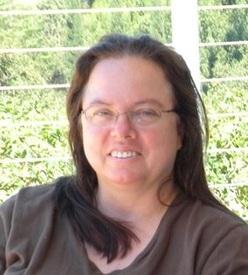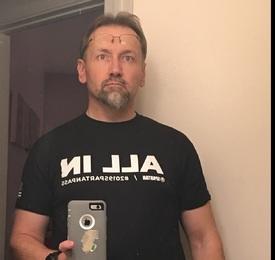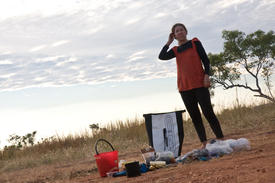What is so wrong with guesstimating?

lorib642
Posts: 1,942 Member
If I am estimating some amounts and still losing am I still doing it "wrong"? I never tried counting calories in the past, it seemed too complicated. I started using this app to get an idea of how many calories I was eating daily. I was pleasantly surprised how easy it is.
I do measure some things, but shared meals, I guess. I think when I have less to lose I may need to be more accurate.
I am getting a little overwhelmed and actually that isn't something I want to do for the rest of my life, but I will if it helps me learn portion sizes.
I do measure some things, but shared meals, I guess. I think when I have less to lose I may need to be more accurate.
I am getting a little overwhelmed and actually that isn't something I want to do for the rest of my life, but I will if it helps me learn portion sizes.
0
Replies
-
Some people do really well estimating portion sizes, but most people just aren't very good at it. If you're losing at the rate you wany/expect, then great! Keep doing what you like. But be aware that if you stop losing then this might be an area that's slowing your progress.0
-
Some people do really well estimating portion sizes, but most people just aren't very good at it. If you're losing at the rate you wany/expect, then great! Keep doing what you like. But be aware that if you stop losing then this might be an area that's slowing your progress.
Thanks. That sounds like it will be my next thing to work on. I am probably like most people.0 -
heres my deal, people can argue with me if they want.
i think... that you should start by weighing some things, especially calorie dense things like meat, cheese, bread... so that you get the idea of what you are looking at. but... eventually you can trust yourself when you cant always get to a scale... unless you cant.... i for example,... will test myself like,,,, cut off a piece of cheese i think is 1 oz, and weigh it. if i am right enough times i dont always have to do it... blah blah blah i could keep talking about this but i will get to my point.
if you are going to NOT weigh or measure your food, i suggest a buffer. i have my calories set 100 calories lower than i have to so that if i make a mistake it aint no thing.
and make sure if you are not weighing that you arent working with a little tiny calorie defecit.
make sure you really do know what you are looking at by testing yourself some... a lot of things may surprise you.
i really just cant imagine the tedium of weighing everything i touch... it just doesnt sound like something i would want to do for life, so i train myself instead.0 -
I have to estimate too, there's nothing wrong with if you're accurate at if, and obviously if you're still losing weight you must be accurate.0
-
I am not going to argue with anyone, but I will agree with Diane. The reality is, if it is not broke do not fix it.
Personally, I was shocked at portioned when I start weighing and measuring, as many people are. At least in the US we have gotten used to large portions (Super-sizing to quote a saying,) and many people need to realize that what they are ingesting is three serving of this or that, not one. But after a few weeks, I fel tlike I was better estimating, and went back to trusting myself, and it helped me.
Personally though, if it ain't broke don't fix it. If you are losing where you want to be then stick with it, but if your losses slow down, then I might recommend measuring and weighting. The fact is if it is too much work, or more than you wanted you are less likily to stick with it, so you have to find your comfort level.
The key to MFP, is not just how much we are eating, but to realize what we are eating. And it sounds like it is helping with the second part. And that is good, the rest is up to you.0 -
I have become pretty good at estimating calories But, there are still things that surprise me. The other day I went to a self serve fro-yo (yogurtland) and put half vanilla and half chocolate. Since they weigh it for you - I could estimate even better. I was so surprised after looking up the calorie count to find that the chocolate shake flavor was twice as many cals as the vanilla- I expected it to be a little more but not TWICE as much.
If you are losing as much as you want I don't think your estimating could be too far off. I made a huge mistake by not weighing myself in the past year (because I didn't want to be bummed out). I started MFP about two months ago -- and to see progress I had weigh myself. I simply could not believe how much weight I put on. I underestimated by about 10 pounds.
Moral of the story- estimating food calories if your losing (and losing as fast as you want) is fine. But, get on the scale yourself and don't estimate that!0 -
Estimating portions does work well... for a while. However, when my weight loss starts to a stall I like to rely on weighing out my portions. I find my guesstimates tend to grow over time along with my weight. I can get a half a jar of peanut butter onto one tablespoon...0
-
Personally though, if it ain't broke don't fix it. If you are losing where you want to be then stick with it, but if your losses slow down, then I might recommend measuring and weighting. The fact is if it is too much work, or more than you wanted you are less likily to stick with it, so you have to find your comfort level.
Agree. Inaccuracy can cause plateaus, but so will stress and lack of adherence. We need to find a balance between accuracy and sustainability. If you stop losing then start weighing your food. It doesn't have to be forever. If you pay attention to what you are doing instead of mindlessly throwing stuff on the scale you will eventually get better at guesstimating. You will learn what a pound of meat or 200g of potatoes look like.
Personally, I don't mind weighing my food (plus I don't have a lot to lose and I'm on a slight deficit so I don't have a big margin of error and accuracy is key) but I understand it can be very stressful for some people.0 -
i don't think it's that bad, if you are actually really good at estimating portion sizes. i'm pretty good at it! i just like memorising numbers and sizes of things, it just comes natural. and 9 out of 10 times i am right, even though i measure or weigh just to make sure. too much tedious weighing and exact measuring can cause stress and get annoying fast. so i guesstimate often, and always allow a little leeway in my calories to make sure i don't go over if i have estimated wrong on the days i don't measure anything. just comes down to what you wanna do and if you come to a stall just go back to weighing & measuring like a busy bee
 0
0 -
I lopped off nearly 3 oz of cheese when I first started... weighted it, and kept having to remove chunks from that 3oz piece to get down to 1 oz. What I was left with seemed like nothing compared to what I had been eating as a serving in the past. Needless to say, I weigh pretty much everything that goes into my face now that isn't already portioned for me (bread slices, a slice of cheese, a cup of yogurt).0
-
Some people do really well estimating portion sizes, but most people just aren't very good at it. If you're losing at the rate you wany/expect, then great! Keep doing what you like. But be aware that if you stop losing then this might be an area that's slowing your progress.
Exactly this!0 -
The closer you get to goal weight, the more accurate your intake needs to be. When you first start out and have a lot to lose, you can get away with guesstimating because even if you aren't accurate, you're still probably at a deficit compared to your old eating patterns. When close to goal, you have a lot fewer calories to work with in order to maintain than you did when you were heavier, so you have to be more careful. As you get closer to goal, if you hit a plateau, stop guesstimating. For now, though, do what works. :flowerforyou:0
-
Nothing wrong with it if you can lose/maintain weight. But with the rise in people being overweight/obese, it doesn't sound like some people actually know how to count calories.
A.C.E. Certified Personal and Group Fitness Trainer
IDEA Fitness member
Kickboxing Certified Instructor
Been in fitness for 30 years and have studied kinesiology and nutrition0 -
I wouldn't estimate anything anymore. If you need to know, look on the fitness app or Google it. I just ate one giant cook and I thought it was going to be like 200 calories. 400 calories! More than Mc Double at Mc Donalds0
-
The closer you get to goal weight, the more accurate your intake needs to be. When you first start out and have a lot to lose, you can get away with guesstimating because even if you aren't accurate, you're still probably at a deficit compared to your old eating patterns. When close to goal, you have a lot fewer calories to work with in order to maintain than you did when you were heavier, so you have to be more careful. As you get closer to goal, if you hit a plateau, stop guesstimating. For now, though, do what works. :flowerforyou:
This is it. I am probably overestimating but I have a big buffer. I definitely will weigh/measure if I plateau. Thanks for all the responses. I am going to keep doing what I am until I get some sort of routine and then I will get a food scale. I think I will burn out if I try too much at once.0 -
LOL i am not even going to read all the other posts. I am just going to tell you what i think.
You are fine without counting calories if you are losing weight. But i think one of the best things to do is learn to be good at guestimating by keeping a food log.
can you at least measure your food when you are cooking? But if you are cooking for others, i am sure this is all too too much. I only have to do food for myself.
When i go onto maintenance soon, i will stop counting calories, though i might come back to just enter a recipe into calorie counter and see how many calories are in a position so i can figure out what the right portion size should be.
There are other good ways too. One intuitive eating system i know has you rating your hunger and satiety before and after eat thing your at. be it a meal a snack a cup of coffee. This system is gone into in detail in a book called Don't GO Hungry for LIfe. Its the second book by DR Amanda Sainsbury Salis. I recommend them both first and second.
I will probably go back to using her rating system again when i stop calorie coating and after a couple of weeks of noting it down, i will be able to do it intuitively (because i've already practiced it a fair bit before).0 -
LOL i am not even going to read all the other posts. I am just going to tell you what i think.
You are fine without counting calories if you are losing weight. But i think one of the best things to do is learn to be good at guestimating by keeping a food log.
can you at least measure your food when you are cooking? But if you are cooking for others, i am sure this is all too too much. I only have to do food for myself.
When i go onto maintenance soon, i will stop counting calories, though i might come back to just enter a recipe into calorie counter and see how many calories are in a position so i can figure out what the right portion size should be.
There are other good ways too. One intuitive eating system i know has you rating your hunger and satiety before and after eat thing your at. be it a meal a snack a cup of coffee. This system is gone into in detail in a book called Don't GO Hungry for LIfe. Its the second book by DR Amanda Sainsbury Salis. I recommend them both first and second.
I will probably go back to using her rating system again when i stop calorie coating and after a couple of weeks of noting it down, i will be able to do it intuitively (because i've already practiced it a fair bit before).
I don't think I could eat intuitively. That sounds harder than weighing food . I just know I would go back to overeating 0
. I just know I would go back to overeating 0 -
I didn't used to weigh a lot of foods, just used to guess. Well, I didn't log for a year as I didn't know about MFP, then when I started logging I continued weighing things like porridge oats, but not much else. I lost 66lbs. I didn't once have a weigh in where I gained. However, I never ate exercise calories back, and I exercised a lot, so that could be why.
I got pregnant with my third, and unfortunately gained weight, and I'm losing again, but this time I am weighing pretty much everything. I'm not losing weight any faster than I did after my 2nd baby.
I think I'm good at guesstimating though! Yesterday I sliced some cheese, put it on the scales. 30g exactly!0 -
A lot of good input here. I got shocked when I started to weigh. Cause my mind literally shaved off kcal as the food was going into my mouth...I thought I had eaten this or that amount. So wrong, lol.
For me, weighing is a tool that makes the whole weight loss journey easier, not harder. It takes the guessing out of the equation. I literally don't have to think about it any more after cooking.
That you want to guesstimate, that's totally your decision to make and whatever works for you:)
Here's some food for thought using both methods: https://www.youtube.com/watch?v=GyME8GthQXE
https://www.youtube.com/watch?v=GyME8GthQXE
http://www.myfitnesspal.com/topics/show/872212-you-re-probably-eating-more-than-you-think
Good luck:)0 -
The basis of MFP for losing weight is based on creating a calorie deficit. That requires accurate information. If that information comes from guesstimating rather than weighing, then it relies on you being good at guesstimating. If you dont record or are out by 10% then this could wipe out your deficit and you would be eating at maintenance or even worse on excess of what you are burning. People tend to be poor at guesstimating so its a risk you are going to make your weight loss more innacurate.
If guesstimating works for you then stick with it, but having information and knowing how much you are consuming is importnat to a lot of people, especially when its said they get a shock when they realise what 100g of something is.
The most common reason for people not losing weight when they think they should be is becayse they are not weighing which results in them not eating at a deficit. If you are good and rely on your ability then do it.0 -
For me, weighing is a tool that makes the whole weight loss journey easier, not harder. It takes the guessing out of the equation. I literally don't have to think about it any more after cooking.
^^Ditto this. After maintaining a 5lb range for years, and estimating a lot, I had difficulty maintaining last winter and didn't understand it. Bought a $14 scale, and wow. So much easier. Never realized how much effort all that estimating was.0 -
For me, weighing is a tool that makes the whole weight loss journey easier, not harder. It takes the guessing out of the equation. I literally don't have to think about it any more after cooking.
^^Ditto this. After maintaining a 5lb range for years, and estimating a lot, I had difficulty maintaining last winter and didn't understand it. Bought a $14 scale, and wow. So much easier. Never realized how much effort all that estimating was.
Really? You find weighing easier? I guess I have to give it a try 0
0 -
-
Nothing is wrong with it if it's working for you. It just doesn't seem to work for many people on here.0
-
I'm with you. There isn't anything wrong with it and don't believe anyone that tells you that. It's all about finding that right balance for you and what is ultimately sustainable. I know I won't weigh everything I eat for the rest of my life, so I'm not going to practice that now...I'm going to get into a habit that will work for me. For some people, weighing everything is what they feel they have to do and certainly their dairy is more accurate but that doesn't mean it's what you have to do if you are successful your way.
I measure somethings, weigh somethings and just estimate others. I still loose weight just fine. I always estimate stuff like broccoli...I mean 25 calories a cup? Ok so if I have a 1.5 cups it's 37 calories? big deal. Not worth my time to worry about (plus extra veg is always good!). I count stuff like grapes and just log a medium banana if that's what it is. I do weigh things like meet, cheese and pasta whenever I can. That said, a food scale is one of the most important things to have in your kitchen in my book but it's up to you how much you find you need to utlize it.0 -
If I am estimating some amounts and still losing am I still doing it "wrong"? I never tried counting calories in the past, it seemed too complicated. I started using this app to get an idea of how many calories I was eating daily. I was pleasantly surprised how easy it is.
I do measure some things, but shared meals, I guess. I think when I have less to lose I may need to be more accurate.
I am getting a little overwhelmed and actually that isn't something I want to do for the rest of my life, but I will if it helps me learn portion sizes.
I think people take different approaches to this. I prefer to take the "least amount of effort possible" approach and then tweak as needed. So yes, I estimate. I didn't want my weight loss to interfere with my lifestyle. I didn't want to pass up invitations to eat out, or to go to BBQs. I didn't want to have to prepare my meals separately or agonize over weighing every piece of meat before cooking. So I estimate more times than not. When it is convenient for me I will measure out of curiosity, but I don't weigh and measure as a rule, I use it more as a reality check. If this is to be a life long change then it has to fit in my lifestyle in the least intrusive way possible. Otherwise it will end up just being a fad for me that I will completely abandon when I lose interest and take on a new hobby to obsess over.
So, I think if you are losing and are happy with the rate of loss, then keep doing what you are doing. As you get closer to your goal, your weight loss will slow down. If you start to feel stuck, then do a portion control recheck, by weighing and measuring for a spell. If I have a party to go to (I find parties the toughest to estimate, because I can usually find a reasonable equivalent for restaurant food, but home cooked meals at someone else's home is tough) I give myself more cushion room by eating less the days surrounding it. I assume that I will probably eat and drink a days worth of calories at the party and let it happen without guilt. Usually my weekly average still falls in my target range, and if it doesn't I don't fret if I see a gain or no change (i'm on maintenance now so no change is my goal), because I know the reason.
The big difference for me now isn't that I completely changed my eating habits, but that I am more mindful about it. Which meals are worth the extra calories and which aren't? Convenience meals that I turn to because I don't want to put in the effort are usually not worth the calories, but a nice night out with friends and family almost always is. I have made similar changes with my finances in the past couple of years and I have been much happier as a result. I have no problem spending money and calories on things that are important to me--but learning to pay attention so that I am better able to identify what is worth the calories or money was the key.0 -
I estimate and have lost 50 pounds so far, but I also overestimate. And try not to hit my calorie allotment ever, and I actually don't eat back all of my exercise calories, only half usually. So far it has worked for me.0
-
I agree, keep doing what you're doing until it doesn't work anymore. If at some point your weight loss slows down or stalls, and it will, go back to strict weighing and measuring to check yourself. Last night I eyeballed myself a "4 oz" glass of cabernet. Then I raised my skeptical eyebrow and pulled out the measuring cup...6 oz. Never hurts to double check.0
-
i love weighing and measuring my food. its so easy for me. estimating actually seems like more work to me. if i weigh it i don't have to think about it, the scale does.
and another word about estimating, i use to estimate my oatmeal using a measuring cup. on a whim i thought, meh, ill weigh it. a serving is suppose to be 40g of dried oatmeal. My measuring cup scoop was 70g. almost double! a difference of 110 calories. If you don't think that will make a difference on your weight gain/loss you're in for a surprise.0 -
Some people look at an 8 ounce steak and think it weighs 3 ounces. lol and there is a big difference in calories. but if you're good at it, and you're losing weight then meh.0
This discussion has been closed.
Categories
- All Categories
- 1.4M Health, Wellness and Goals
- 395.6K Introduce Yourself
- 44.1K Getting Started
- 260.7K Health and Weight Loss
- 176.2K Food and Nutrition
- 47.5K Recipes
- 232.7K Fitness and Exercise
- 446 Sleep, Mindfulness and Overall Wellness
- 6.5K Goal: Maintaining Weight
- 8.6K Goal: Gaining Weight and Body Building
- 153.2K Motivation and Support
- 8.2K Challenges
- 1.3K Debate Club
- 96.4K Chit-Chat
- 2.5K Fun and Games
- 4.3K MyFitnessPal Information
- 16 News and Announcements
- 1.3K Feature Suggestions and Ideas
- 2.9K MyFitnessPal Tech Support Questions
























